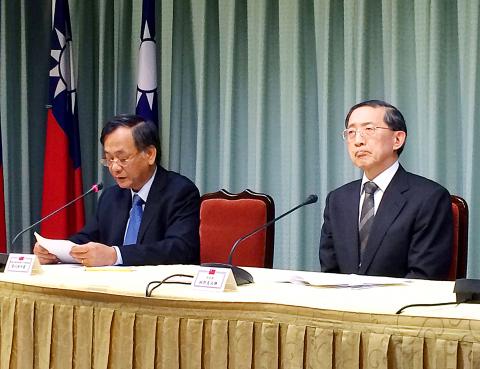Vietnam’s chief envoy to Taiwan yesterday apologized on behalf of his government to Taiwanese businesses that suffered losses as a result of the anti-China protests in his country and said his government is considering offering tax cuts and other forms of compensation to those enterprises.
Vietnam Economic and Cultural Office in Taipei Director Bui Trong Van expressed “deep regret and apologies” to the investors on behalf of Hanoi at a press conference at the Ministry of Foreign Affairs in Taipei.
He had previously offered a “personal” apology over the losses suffered by Taiwanese in his country, but was summoned yesterday by Minister of Foreign Affairs David Lin (林永樂), who asked that the Vietnamese government apologize, punish those responsible and compensate the affected investors.

Photo: CNA
Over the past few days, Vietnamese officials have been meeting with foreign investors to assess the losses and will take steps to compensate these businesses, Bui said.
Reducing or waiving land or business taxes could be one of the forms of compensation, which may also include offering the affected businesses concessional loans or debt relief on overdue loans, he said.
“The most important goal is to help companies resume normal production activities as soon as possible,” Bui said.
“It is in the interests of foreign-funded companies, the Vietnamese workers and the Vietnamese government and the country,” he said.
Lin said a deputy minister from the Ministry of Economic Affairs will lead a delegation to Vietnam this week with the aim of expediting the compensation arrangements.
“After our Ministry of Economic Affairs delegation arrives in Vietnam, we hope to gain a better understanding of and further study all compensation matters,” Lin said.
Anti-China protests erupted on Tuesday last week in Vietnam after China earlier this month deployed an oil rig near the Paracel Islands (Xisha Islands, 西沙群島), an area claimed by both Beijing and Hanoi, as well as by Taiwan.
Many factories in industrial parks in Vietnam, including several run by Taiwanese companies, were either set alight or vandalized during the protests.
Early estimates show that 107 Taiwanese businesses were vandalized, with about 10 factories having to suspend operations because of the damage.
Meanwhile, in Hanoi at a press briefing on Saturday evening, Vietnamese government officials said that Hanoi is sympathetic toward Taiwanese and other foreign investors whose businesses have been affected by the anti-China rioting there and has promised to help them resume production.
Do Nhat Hoang, director of Vietnam’s Bureau for Management of Foreign Investment under the Ministry of Planning and Investment, said that the damage to Taiwanese and other foreign companies had occurred as a result of misunderstandings and provocation by “lawless individuals.”
Vietnamese authorities are sympathetic toward those investors and are taking appropriate measures to assist them in restarting production, he said in response to questions by officials of Taiwan’s representative office in Hanoi.

The Taiwanese passport ranked 33rd in a global listing of passports by convenience this month, rising three places from last month’s ranking, but matching its position in January last year. The Henley Passport Index, an international ranking of passports by the number of designations its holder can travel to without a visa, showed that the Taiwan passport enables holders to travel to 139 countries and territories without a visa. Singapore’s passport was ranked the most powerful with visa-free access to 192 destinations out of 227, according to the index published on Tuesday by UK-based migration investment consultancy firm Henley and Partners. Japan’s and

NATIONAL SECURITY THREAT: An official said that Guan Guan’s comments had gone beyond the threshold of free speech, as she advocated for the destruction of the ROC China-born media influencer Guan Guan’s (關關) residency permit has been revoked for repeatedly posting pro-China content that threatens national security, the National Immigration Agency said yesterday. Guan Guan has said many controversial things in her videos posted to Douyin (抖音), including “the red flag will soon be painted all over Taiwan” and “Taiwan is an inseparable part of China,” while expressing hope for expedited “reunification.” The agency received multiple reports alleging that Guan Guan had advocated for armed reunification last year. After investigating, the agency last month issued a notice requiring her to appear and account for her actions. Guan Guan appeared as required,

Japan and the Philippines yesterday signed a defense pact that would allow the tax-free provision of ammunition, fuel, food and other necessities when their forces stage joint training to boost deterrence against China’s growing aggression in the region and to bolster their preparation for natural disasters. Japan has faced increasing political, trade and security tensions with China, which was angered by Japanese Prime Minister Sanae Takaichi’s remark that a Chinese attack on Taiwan would be a survival-threatening situation for Japan, triggering a military response. Japan and the Philippines have also had separate territorial conflicts with Beijing in the East and South China

A strong cold air mass is expected to arrive tonight, bringing a change in weather and a drop in temperature, the Central Weather Administration (CWA) said. The coldest time would be early on Thursday morning, with temperatures in some areas dipping as low as 8°C, it said. Daytime highs yesterday were 22°C to 24°C in northern and eastern Taiwan, and about 25°C to 28°C in the central and southern regions, it said. However, nighttime lows would dip to about 15°C to 16°C in central and northern Taiwan as well as the northeast, and 17°C to 19°C elsewhere, it said. Tropical Storm Nokaen, currently